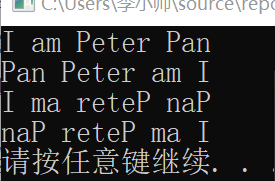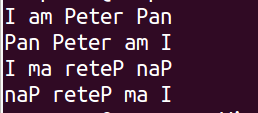69,373
社区成员
 发帖
发帖 与我相关
与我相关 我的任务
我的任务 分享
分享
scanf("%s%s%s%s", s[0], s[1], s[2], s[3]);scanf("%s%s%s%s", s[0], s[1], s[2], s[3]);scanf("%s%s%s%s", s[0], s[1], s[2], s[3]);scanf("%s%s%s%s", s[0], s[1], s[2], s[3]);Pan Peter am I Pan Peter am I Pan Peter am I Pan Peter am I #include <stdio.h>
#include <string.h>
void Reverse_char(char *s)
{
int i, end = strlen(s) - 1;
for(i = 0; i <= end / 2; ++i){
char ch = s[i];
s[i] = s[end - i];
s[end - i] = ch;
}
}
void Reverse_string(char (*s)[49], int size)
{
int i;
for(i = 0; i <= (size - 1) / 2; ++i){
char p[49] = {0};
memcpy(p, s[i], 49);
memcpy(s[i],s[size - 1 - i], 49);
memcpy(s[size -1 - i], p, 49);
}
}
int main(void)
{
char s[4][49] = {""};
int i;
scanf("%s%s%s%s", s[0], s[1], s[2], s[3]);
Reverse_string(s, 4);
for(i = 0; i < 4; ++i){
printf("%s ", s[i]);
}
printf("\n");
Reverse_string(s, 4);
for(i = 0; i < 4; ++i){
Reverse_char(s[i]);
printf("%s ", s[i]);
}
printf("\n");
Reverse_string(s, 4);
for(i = 0; i < 4; ++i){
printf("%s ", s[i]);
}
printf("\n");
return 0;
}
#include <stdio.h>
#include <string.h>
void Reverse_char(char *s)
{
int i, end = strlen(s) - 1;
for(i = 0; i <= end / 2; ++i){
char ch = s[i];
s[i] = s[end - i];
s[end - i] = ch;
}
}
void Reverse_string(char (*s)[49], int size)
{
int i;
for(i = 0; i <= (size - 1) / 2; ++i){
char p[49] = {0};
memcpy(p, s[i], 49);
memcpy(s[i],s[size - 1 - i], 49);
memcpy(s[size -1 - i], p, 49);
}
}
int main(void)
{
char s[4][49] = {"I", "am", "Peter", "Pan"};
int i;
Reverse_string(s, 4);
for(i = 0; i < 4; ++i){
printf("%s ", s[i]);
}
printf("\n");
Reverse_string(s, 4);
for(i = 0; i < 4; ++i){
Reverse_char(s[i]);
printf("%s ", s[i]);
}
printf("\n");
Reverse_string(s, 4);
for(i = 0; i < 4; ++i){
printf("%s ", s[i]);
}
printf("\n");
return 0;
}#include <stdio.h>
#include <string.h>
void Reverse_char(char *s)
{
int i, end = strlen(s) - 1;
for(i = 0; i <= end / 2; ++i){
char ch = s[i];
s[i] = s[end - i];
s[end - i] = ch;
}
}
void Reverse_string(char (*s)[49], int size)
{
int i;
for(i = 0; i <= (size - 1) / 2; ++i){
char p[49] = {0};
memcpy(p, s[i], 49);
memcpy(s[i],s[size - 1 - i], 49);
memcpy(s[size -1 - i], p, 49);
}
}
int main(void)
{
char s[4][49] = {"I", "am", "Peter", "Pan"};
int i;
Reverse_string(s, 4);
for(i = 0; i < 4; ++i){
printf("%s ", s[i]);
}
printf("\n");
Reverse_string(s, 4);
for(i = 0; i < 4; ++i){
Reverse_char(s[i]);
printf("%s ", s[i]);
}
printf("\n");
Reverse_string(s, 4);
for(i = 0; i < 4; ++i){
Reverse_char(s[i]);
printf("%s ", s[i]);
}
printf("\n");
return 0;
}